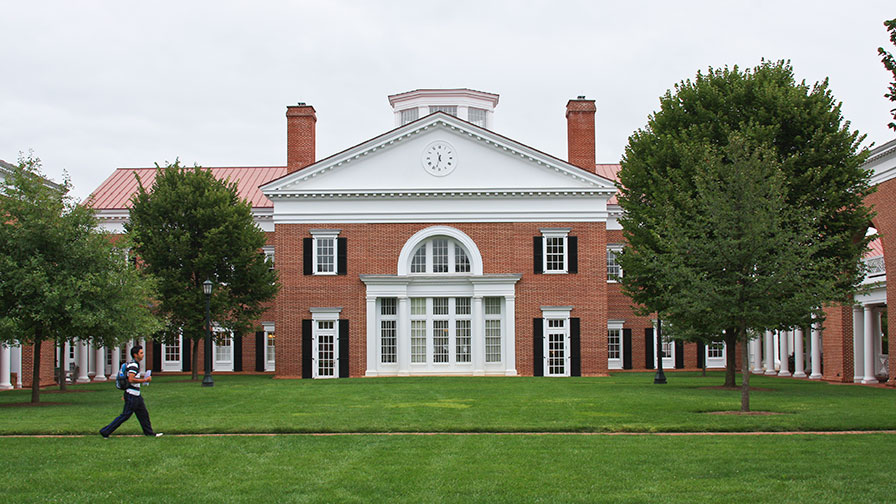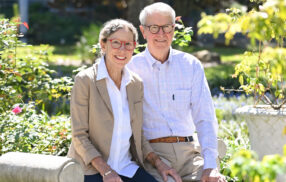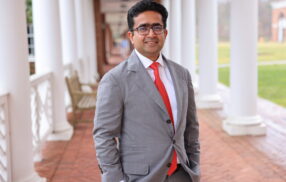
Partnerships and Collaboration Common Themes at UVA Darden School 2015 Business in Society Conference
By Laura Hennessey Martens
Partnerships, collaboration and reaching across sectors were the themes of the day at the 2015 Business in Society Conference held at the University of Virginia Darden School of Business on 20 March 2015.
The focus of this year’s student-led conference was public-private partnerships, often called PPP or P3s, which refers to a government service or private business venture funded and operated through a partnership between public and private sector organizations.
Throughout the full-day conference, speakers and panelists frequently pointed to public-private partnerships as critical to achieving successful results in today’s complex, global environment.
Special Representative for Global Partnerships Andrew O’Brien of the U.S. Department of State Secretary’sOffice of Global Partnerships, the conference’s keynote speaker, informed the UVA students, faculty and staff in attendance, “In order to make things happen, you have to involve people. No single government, however powerful, can create positive change entirely on its own.”
O’Brien launched the day’s sessions in an engaging dialogue with audience members about the role of public-private partnerships and the work of the Secretary’s Office of Global Partnerships, which he described as an “entry point” for collaboration between the U.S. Department of State, the public and private sectors, and civil society.
O’Brien and the U.S. Department of State Secretary’s Office of Global Partnerships collaborate closely with the Darden School Institute for Business in Society on annual initiatives, including presenting the P3 Impact Award at the Concordia Summit, which celebrates model P3s from around the world, and helping to promote Global Partnerships Week, a series of global, national and local events which recognize the critical role public-private partnerships play in promoting diplomacy and development around the world. Applications for the 2015 P3 Impact Award are currently underway and will be accepted through 30 April 2015 on the P3 Impact Award website.
In a back-and-forth dialogue with audience members, O’Brien illustrated how the needs and objectives of government, nongovernmental organizations (NGOs) and businesses are intricately interconnected. He gave several examples in which companies, nonprofits and the U.S. government formed P3s to address complex issues such as global climate change, the recent Ebola epidemic and the need to provide education and business opportunities to women in underdeveloped countries. Referring to each sector, O’Brien stated, “We are all working on the same things in a lot of ways. P3s help bring it all together.”
O’Brien added that reaching across political, ideological and international barriers can not only solve problems and produce quicker results, but can deliver the added benefit that “sometimes you make unlikely friendships along the way.”
Following Andrew O’Brien’s keynote session was a panel discussion on social impact bonds — a new method of funding public-private partnerships — by Larry Wilder Jr., special adviser for social entrepreneurship and innovation at the Commonwealth of Virginia’s Office of the Secretary of Commerce and Trade, and Robert H. Dugger, co-founder & chair of ReadyNation. During lunch, Edith Cecil, vice president of professional exchange and community outreach at the Institute of International Education (IIE), led a fireside chat to explore the role that international nongovernmental organizations play in public-private partnerships.
The conference closed with a talk by Marc-Philip Ferzan, a lecturer in public policy at theUVA Frank Batten School of Leadership and Public Policy, on how P3s provide for a compelling opportunity to help build resiliency in the nation’s infrastructure as the world adapts to climate change. Ferzan, who previously served on the senior staff and cabinet of the Governor of New Jersey in the aftermath of Hurricane Sandy, evaluated the benefits of using P3s to enhance critical infrastructure so it better withstands more frequent and severe weather events and other hazards.
Flashing images of devastation caused by Hurricane Sandy, including crumbled buildings, damaged roadways and transit systems and flooded businesses, Ferzan asked audience members to imagine the challenges of government, companies, NGOs and philanthropists working together to rebuild New Jersey. “Every major sector had been impacted,” added Ferzan.
Ferzan also demonstrated how vital energy, transportation and water in particular are to all sectors. He stressed the importance of the U.S. and other countries “acting now and acting quickly to mitigate the impact of future disaster events.” He estimated that “for every dollar spent on building resiliency in communities at risk for disasters, we can save as much as $4 in post-disaster costs as a nation.”
The conference was organized and sponsored by the UVA Darden School’s Net Impact Club, Emerging Markets Development Club, Energy Club, Education Club, Business & Public Policy Club, Healthcare Club and Institute for Business in Society, as well as the UVA Frank Batten School of Leadership and Public Policy.
The University of Virginia Darden School of Business prepares responsible global leaders through unparalleled transformational learning experiences. Darden’s graduate degree programs (MBA, MSBA and Ph.D.) and Executive Education & Lifelong Learning programs offered by the Darden School Foundation set the stage for a lifetime of career advancement and impact. Darden’s top-ranked faculty, renowned for teaching excellence, inspires and shapes modern business leadership worldwide through research, thought leadership and business publishing. Darden has Grounds in Charlottesville, Virginia, and the Washington, D.C., area and a global community that includes 18,000 alumni in 90 countries. Darden was established in 1955 at the University of Virginia, a top public university founded by Thomas Jefferson in 1819 in Charlottesville, Virginia.
Press Contact
Molly Mitchell
Associate Director of Content Marketing and Social Media
Darden School of Business
University of Virginia
MitchellM@darden.virginia.edu





